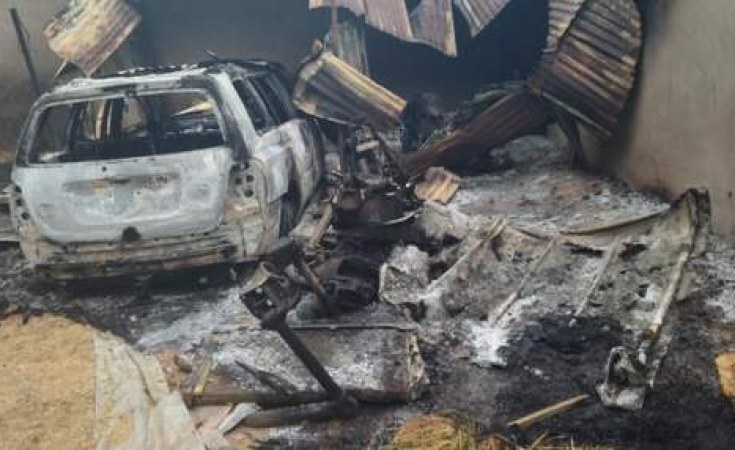The terrorist said the communities must pay N3 million or face his wrath.
Three communities in Shinkafi Local Government, Zamfara State have been forced to pay N3 million to a notorious banditry kingpin, who is known by the alias, Dan Bokolo, to avoid being attacked, PREMIUM TIMES has learned.
The terrorist is believed to be angry with residents of the communities- Kamarawa, Sabuwar Kamarawa and Gebe for allegedly providing security operatives with the information used in the arrest of his brother, Abdullahi.
The payment of the protection levy is against the stand of the governor of the state, Dauda Lawal, who maintained the state government would not dialogue with the terrorists.Local sources told PREMIUM TIMES that the terrorist's brother, Abdullahi, was arrested at a market in the area when he had gone to transact business. It was alleged that some members of the community told security operatives of his whereabouts.
"That was the beginning of our troubles," a resident of Kamarawa who sought anonymity told PREMIUM TIMES. "Dan Bokolo was angry because he was told that it was people from any of these three communities that gave information that led to the arrest of his brother."
The terrorist was planning to attack the communities when elders in the area decided to reach out to him for a peace deal.
"Our elders were able to convince some Fulani elders that Abdullahi was arrested by the security agents and it was not anyone from our community that gave out the information. He (Dan Bokolo) was convinced that our people didn't "betray" his brother but he still said we must buy peace from him.
After a series of negotiations, the terrorist, Dan Bokolo agreed that the three villages should pay and fine of N3 million for telling on his brother. He had originally asked for N6 million.
Basharu Guyawa, a peace advocate and a human rights activist, said payment of protection levies has become a norm in eastern Sokoto and Zamfara.
He said he spoke to various residents in Kamarawa who told him the communities have raised the money the terrorists demanded.
"Bello Turji [another notorious terrorist] had to intervene for Dan Bokolo to even listen to the people of the communities. The problem is how sure are we that he is going to keep to his promise not to attack the area?" Mr Guyawa said.
Terrorists in the state and other areas especially in Sokoto and Katsina are fond of taxing residents of local communities.
Last year, PREMIUM TIMES reported exclusively how residents of 14 communities of Anka Local Government paid N19 million and provided a canoe to terrorists to avoid being attacked. The payment was also a levy the terrorist demanded to allow the agrarian communities to cultivate their farms. Several communities have also been forced into paying millions of naira by the terrorists as documented by PREMIUM TIMES in a month-long investigation.Zamfara governor reacts
The Senior Special Assistant to Zamfara governor on broadcast and public affairs, Mustapha Jafaru, said the state government was not aware and was not a part of the agreement.
"We've always maintained that we'll not dialogue with terrorists in Zamfara State. Dauda (the governor) has always said that he would not negotiate with them because they're criminals. So if the communities are discussing with bandits, we don't have anything to do with that arrangement and we're not part of it because that's not our style.
"Ever since we came onboard, we've been trying to curtail the activities of these terrorists through different ways but dialogue is not one of the ways we're following. We'll continue to protect the people of Zamfara State as we've been doing," Mr Jafaru said.
He said during the campaign, Mr Lawal promised to tackle the insecurity and he has been doing that.
For over a decade, terrorists have been operating in the northwestern part of the country. Their activities snowballed after the 2019 general election when they began attacking travellers on major highways in the region, especially on the Abuja-Kaduna Expressway.
The intensity and frequency of their attacks on rural communities in the region increased. Livestock rustling, abductions and mass killings sometimes of entire communities - were reported almost daily.


